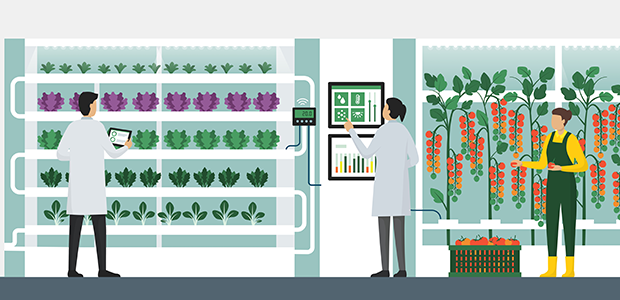
Vertical Future selected by UK Space Agency to install systems to grow crops in Low Earth Orbit
Vertical Future, a specialist in vertical farming technology and manufacturing based in the UK, received a grant of £1.5 million for the delivery of the project's second phase, "Autonomous Agriculture for Space Exploration."
This initiative aims to adapt VF's controlled-environment-agriculture (CEA) systems for prototyping Low Earth Orbit (LEO) growing systems, intended for use in Axiom Space's first commercial space station, scheduled for orbit in 2026. VF is recognised for designing, manufacturing, and deploying intelligent autonomous CEA systems worldwide, with applications extending beyond leafy greens to pharmaceuticals, nutraceuticals, integration with greenhouses, and space research and development. VF's systems, known for their adaptability and integrity, provide robust, reliable, and resilient CEA solutions.
The UK Space Agency exclusively selected VF's proposal due to its technological expertise and leadership in plant science. The project aligns with the UK's ambitions for a human presence in LEO and beyond, forming part of the UK Space Agency’s £20 million International Bilateral Fund programme. This unique project aims to drive innovation and sustainability, contributing significantly to commercial space exploration and the Artemis Accords. The technologies developed will not only support initial LEO activities but also facilitate expansion into Mars missions in the 2030s, with the ultimate goal of applying these solutions to the Lunar Gateway, Lunar surface, and Martian surface.
VF's systems, capable of adaptation to all Earth environments, will introduce the first fully remotely monitored farm system through this project. This advancement enables the tracking of productivity across environments on Earth, in orbit, and on lunar and Martian bases.
The development of space-deployable technology has historically benefited life on Earth, with over 30,000 commercial applications since the 1950s, including scratch-resistant lenses and cordless tools. Technologies honed through this project will enhance productivity and operational efficiency in controlled environment agriculture. Vertical Future stands ready to implement these advancements on Earth, addressing the challenges posed by climatic shocks, international unrest, and geographical constraints on food production.
An international collaboration established the project, supported by the UK Space Agency, NASA, and the Australian Space Agency (ASA). It unites World Economic Forum Innovator Axiom Space, mission operations experts Saber Astronautics, and research partners from the ARC Centre of Excellence in Plants for Space (Universities of Adelaide, Western Australia, and Cambridge) and iLAuNCH (University of Southern Queensland), with additional support from the South Australian Space Industry Centre (SASIC).
Commenting on the milestone, Dr Jen Bromley, Chief Scientific Officer and Autonomous Agriculture Project Lead at VF, said: “The further we go into space, the more we will need to produce while we’re there, be it food, biomaterials, or medicines. Plants are able to be the biofactories to cover all of these needs. The ability to reliably grow off-Earth is not yet realised as the technologies to achieve this haven’t yet been implemented away from Earth at the scale required to sustain life. The autonomous agriculture project puts VF and the UK at the front and centre, leading and defining a new category for the commercial space sector: Agri-Space. The skills and sector-specific knowledge brought by our incredible partners are crucial to delivering the project, including sensor development critical to delivering an autonomous growing environment and enabling fine-tuning of parameters that cannot be tested outside of a micro-gravity environment.”
Jana Stoudemire, Director, In-Space Manufacturing at Axiom Space said: “This project embodies our commitment to improve life on Earth and foster the possibilities beyond it, building a home in space that benefits every human, everywhere. CEA systems address not only physiological benefits but psychological benefits to crew health and can serve as biomanufacturing facilities as well. Autonomous agriculture systems support future Commercial LEO Destinations and enable exploration initiatives for Lunar and Mars missions. As we go further in space exploration, the need for on-demand production is a critical component that presents an opportunity for the UK to lead in the development of technology providing food and producing plants to develop medicine and materials to 3D print structures and tools that we can’t take with us but will need in these new environments.”
Professor Anu Ojha, Director of Championing Space at the UK Space Agency, said: “Our International Bilateral Fund bolsters international collaboration that harnesses the UK’s national expertise, supports new space capabilities, and catalyses investment. Supporting innovative projects like the development of a robotic ‘space farm’ facility to grow plants in space is a great opportunity to showcase the UK as a spacefaring nation, whilst enhancing the wider UK space sector, creating jobs and generating further investment.”
Prof Matthew Gilliham, Director of P4S, headquartered at the Waite Research Institute, University of Adelaide, said: “Through incentivising international collaboration the UK Space Agency has brought together world-leading capabilities to deliver novel technologies that – in our case – will deliver sustainability solutions for Space and Earth’.”

